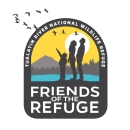Ways to Get Involved
National wildlife refuges partner with volunteers, youth groups, landowners, neighbors and local community members to make a lasting difference. Getting involved at Tualatin River National Wildlife Refuge is a great opportunity to learn new skills and help to conserve our public lands. With a variety of opportunities in a wide range of programs, anything from visitor services to habitat management, there is a place for everyone to get involved.
Volunteering
Volunteering for the U.S. Fish and Wildlife Service is a great way to engage in conservation work, and get involved in the community. With volunteer opportunities in nearly every aspect of the refuge, from our biology program to visitor services, there are a multitude of ways to gain new skills and meet new people.
Volunteer Options The Refuge Offers
Please note that the Refuge is not always recruiting for each of these roles. You can find the current recruitment options in the Volunteer Opportunities section below- links will be live if staff are currently recruiting.
Visitor Center Volunteer
Our Visitor Center serves as a gathering place and launching point for visitors, groups, and refuge programs; since this building is entirely staffed by volunteers, they are often the first faces people see when they arrive at the refuge. Volunteers help orient visitors to the refuge, and help educate about our mission to conserve and protect habitat for wildlife. Training is provided and required prior to volunteering in the Visitor Center.
Refuge Trail Rovers
Trail Rovers provide a link between the Refuge and the Community by helping visitors connect with what they are experiencing on the trails. Rovers often share their love and knowledge of what can be discovered here. These volunteers help the visiting public in many ways and are often the eyes and ears of Refuge staff on the trails, communicating needs and concerns to help keep the Refuge safe and welcoming for all to visit. Training is provided and required prior to being a Trail Rover.
Refuge Naturalist
Naturalists provide a welcoming and safe opportunity for students and groups to learn about conservation. Our Naturalists assist with school field trips, off-site programs, special events and many other opportunities to share information about Refuges and conservation. Training is provided and required prior to being a Refuge Naturalist.
Second Saturday Work Parties
Help with conservation and restoration efforts by participating in regularly scheduled work parties. Projects typically include invasive plant management, native plantings, or trash removal. This is a great way to participate in environmental stewardship, meet others in the community who enjoy the outdoors, and get behind-the-scenes looks at the refuge. Find more information and register on the Friends of Tualatin River National Wildlife Refuge website. For questions call (503) 625-5944 ext. 15238
How to Apply
If you are interested in volunteering in the Visitor Center you can apply at this link volunteer.gov. If you are only interested in the work parties, please reach out to us directly, at the number below, and let us know of your interest. If you have any questions about the volunteer program please contact us at tualatinriver@fws.gov or call us at 503-625-5944.
Our Partners
Work with our local partners throughout the community allow us to further our mission to “to administer a national network of lands and waters for the conservation, management and, where appropriate, restoration of the fish, wildlife and plant resources and their habitats within the United States for the benefit of present and future generations of Americans.” Partnerships help us to work within our community, and to be a community asset of conservation. Learn more about our local partners below.
The refuge works closely with our Friends group, the Friends of the Tualatin River National Wildlife Refuge Complex. The mission of the Friends is "to promote the conservation and welfare of the Tualatin River National Wildlife Refuge Complex for all dependent species and to enrich the lives of citizens through education and experience." The Friends support the refuge in almost all aspects of conservation, including biological, educational, and outreach work.

